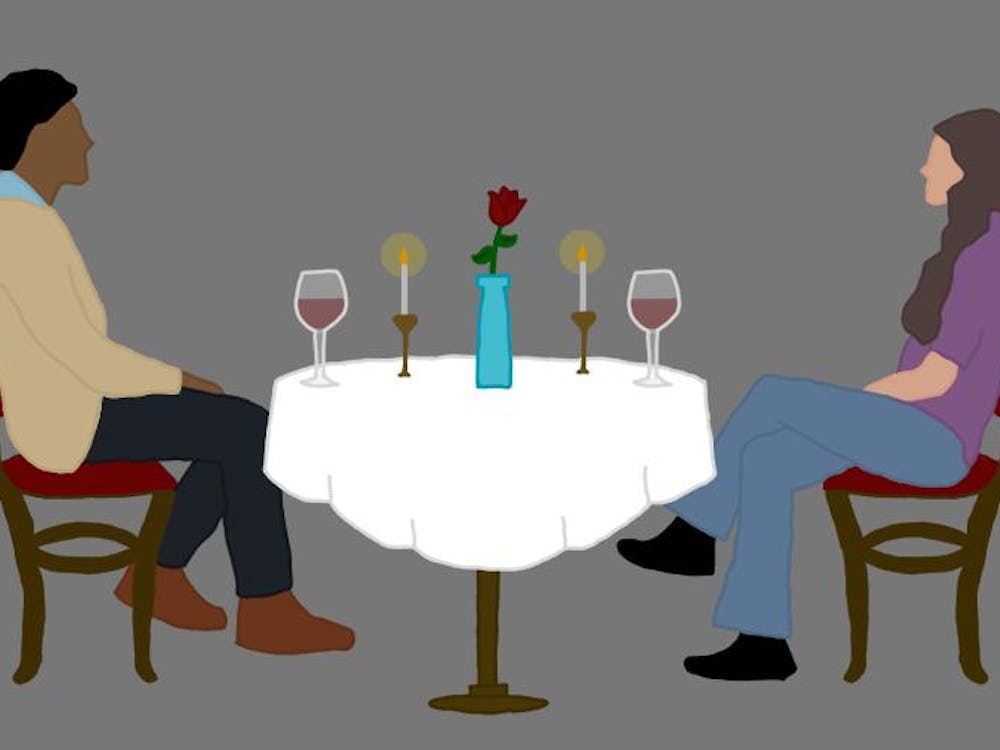W hen you have a well-known family and live in the center of the public eye, do you have an unlisted phone number and live in an exclusive neighborhood? Not if you are Virginia state Sen. Emily Couric.
Instead, Couric, a Democrat, seems right where she belongs in a large and beautifully decorated house on Rugby Road.
"My husband likes living near the hospital," Couric said of Dr. Beller, her spouse of 20 years and the chief cardiologist at the University's medical center. "We both like all the action and the fraternities and sororities and the hubbub of student life."
Couric and her husband are even listed in the phone book with every other Charlottesville resident.
Not that making oneself accessible to the community doesn't have its downside: In the middle of the interview, Couric is interrupted by her legislative aide, Tracy Eppard. "Do you mind if I borrow her for a second?" Eppard asked, glancing uncomfortably at her boss.
A couple minutes later, the two reemerged into the living room and Eppard exchanged a questioning look with the senator.
Unperturbed, Couric nodded. "You can say what that was." "It was a collect call from a man in jail," Eppard said.
"I don't accept them," Couric clarified. "I also get a lot of letters from prisoners asking me to help get them out of jail, but I can't interfere with the judicial system."
But it is no wonder she gets the appeals. For behind the soft-spoken woman with an endearing habit of biting her lip as she thinks is one of Charlottesville's most powerful political leaders. Petite and almost fragile-looking, with big kind eyes and short auburn hair, Emily Couric, 54, serves as one of this community's more prominent everyday heroes.
Growing up
Couric was born in Atlanta, but her family moved to Northern Virginia when she was four. She says she got along well with her three siblings, one of whom is the well-known University alum and NBC's "Today"host Katie Couric.
"The children all had a wonderful time together and they all loved each other," said John Couric, Katie and Emily's father. "They always were and they still remain very close to each other."
Emily Couric attended public high school and excelled academically. As an adolescent, she describes herself as "very middle class. Very ordinary. There was a strong work ethic in my family and expectations that we would study a lot."
Proof of this talent and hard work became manifest at Couric's graduation as a Phi Beta Kappa from Smith College in Massachussetts, which she describes as an academically rigorous school.
"She was very smart and hardworking and always did her best," said John Couric. "She was very competitive. We tried to support her in all of her activities, like we did for all four of our children. We wanted to bring them up in a way that they would understand the need for honor and integrity, and the need the worthwhile nature of serving, whether it's in a profession or not."
And Couric indeed did learn more than how to be successful at school. "I try to learn something from everybody. My parents taught me that you can learn something from everyone you meet, and that's what I try to do."
Life after college
Couric's career started as a reporter in Washington, covering issues about government, lawyers and the practice of law for specialized legal publications.
But after meeting her future husband on a plane ("There was a seat between us but no one was sitting in it"), Couric moved to Charlottesville and "became really involved in this community." She chaired the Charlottesville school board and continues to make public education one of her primary focuses in the Virginia Senate.
"She's very educationally oriented, obviously, since she served on the school board," said Democratic state Del. Mitch Van Yahres. "She's very interested in the academic end of the University."
Serving the University
Couric, whose son Ray recently graduated from the University's medical school, does not specifically cater her politics to University students because very few qualify as her constituents. However, she does represent both the University as a whole as well as Piedmont Virginia Community College.
"U.Va. is a great school. It has a wonderful reputation," Couric said. "The students are very bright and go on to be very successful."
One of Couric's education-oriented bills provides high school students with more advanced technology training. Another bill she sponsored encourages state agencies as well as the University to give away surplus materials and computers to underprivileged children.
John Couric, who used to be a political reporter, notes that his daughter "is a strong voice for education, among other things. A very strong voice for education."
The Charlottesville community
One of the primary ways Couric believes she has managed to become successful is by her involvement in the community.
Van Yahres agreed that much of Couric's success is due to her strong community support. "She got involved very heavily in the community, and later on she went into politics and did an exceptionally good job of beating an incumbent senator at the time," he said.
Couric was first elected to the Virginia Senate in 1995, and again in 1999 in a landslide victory in which she won every precinct. She currently serves as general chairman of the state Democratic Party.
"I've worked so hard to reach out to constituents and get to know them and their lives," Couric said. "I've gone to their community events and tried to understand issues important to them. People appreciate that."
Charlotte Dammans, one of Couric's close friends, said that local residents know Couric is concerned about them and their problems because "she's a good listener."
Priorities and lessons
After being diagnosed with pancreatic cancer last summer, Couric's health became the focus of a great deal of media attention, as she relinquished her 2001 bid for the lieutenant governor of Virginia. But Couric makes it clear she would rather not ruminate on her widely publicized illness, but instead focus on how she has grown as a person and a politician.
"I've learned it's important to be patient and to have a lot of faith, and to accept the love and support of people around you," she said.
Couric says that her children are truly her greatest accomplishment. "Obviously my family is my top priority, but I love my job. It adds a lot of pleasure to my life," she said.
She also stresses the need for all citizens to become involved in politics and for students to recognize that "they need to understand their government and form their own opinions."
An inconspicuous book on Couric's coffee table is a fitting symbol of her accomplishments. Yet it may not be the main title, Icons of the Twentieth Century, that mainly applies to Couric, but rather the book's subheading that captures the essence of her career: Men and women who have made a difference.






